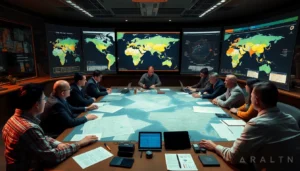Table of Contents
ToggleIn a world where borders blur and cultures collide, a global affairs major is like having a backstage pass to the planet’s biggest show. It’s not just about memorizing capitals or debating the merits of pineapple on pizza; it’s about understanding the intricate dance of diplomacy, economics, and social issues that shape our lives. With this degree, students can transform into savvy global citizens ready to tackle the world’s most pressing challenges.
Imagine diving into discussions on climate change while sipping coffee from a fair-trade shop, or negotiating peace treaties over a game of chess. A global affairs major equips students with the skills to navigate complex international landscapes, making them the superheroes of the modern age—minus the capes, of course. Whether they’re eyeing a career in diplomacy, international business, or non-profit work, this major opens doors to a future where they can truly make a difference.
Overview Of Global Affairs Major
The global affairs major equips students to navigate the intricacies of an interconnected world. A focus on international relations, policy-making, and socio-economic factors prepares graduates to address global challenges.
Definition and Purpose
Global affairs encompasses the study of international relations, cultural exchange, and global governance. Its purpose lies in fostering informed citizens who understand the dynamics shaping global interactions. This major emphasizes critical thinking, analytical skills, and awareness of diverse perspectives. Students explore significant conflicts, humanitarian issues, and international treaties, enhancing their ability to propose effective solutions. Through this lens, graduates contribute to diplomatic efforts and global sustainability, influencing policies that affect communities worldwide.
Core Curriculum
The core curriculum of a global affairs major typically includes courses on international relations, global economics, and comparative politics. Students engage with case studies focused on contemporary issues, trade policies, and human rights. Electives often cover specialized topics such as security studies, environmental policy, and cultural diplomacy. Research methods are also integral, equipping students with skills to analyze data and conduct field studies. This diverse curriculum ensures graduates possess a comprehensive understanding of the global landscape and the competencies needed for effective engagement.
Skills Acquired
A global affairs major equips students with essential skills necessary for navigating international landscapes. Graduates emerge with a diverse skill set that enhances their employability and effectiveness in various fields.
Analytical Skills
Students sharpen analytical skills, enabling them to dissect complex global issues. They learn to evaluate data critically and draw informed conclusions. This skill helps them assess the implications of international policies and socio-economic trends. With strong analytical capabilities, graduates excel in research roles, policy analysis, and strategic planning. They can identify patterns in global events, providing insights that inform decision-making processes. Overall, these skills prove invaluable for tackling real-world challenges in diplomacy and international relations.
Communication Skills
Effective communication skills stand out as a key focus of the global affairs curriculum. Students develop the ability to articulate ideas clearly, whether in written reports or oral presentations. They practice crafting persuasive arguments that resonate with diverse audiences. Strong interpersonal skills also enable graduates to engage with stakeholders from various cultural backgrounds. Networking opportunities allow students to hone these skills in real-world settings, preparing them for careers in diplomacy, international business, and non-profit organizations. Graduates can advocate for policy initiatives, fostering collaboration across borders.
Career Opportunities
Graduates of a global affairs major access a variety of career opportunities across multiple sectors. The skills and knowledge acquired prepare them to engage effectively in government, international organizations, and the nonprofit sector.
Government and Public Policy
Students often pursue careers in government and public policy. Analysts in this field shape policies that address global issues, such as climate change and human rights. Positions range from working in local government agencies to international diplomatic missions. Critical thinking and strong communication abilities are essential for crafting effective legislation. These roles provide graduates with the opportunity to influence public policy on a national or international level.
International Organizations
Opportunities also abound in international organizations like the United Nations and World Bank. Graduates find themselves working on projects that promote peace, development, and humanitarian assistance. These positions often require collaboration with global partners to address pressing challenges. Multilingual skills can enhance employability, as communication with diverse stakeholders becomes vital. Exposure to various cultures in these roles fosters a broader understanding of international relations.
Nonprofit Sector
The nonprofit sector offers another avenue for global affairs graduates. Organizations focusing on social justice, environmental conservation, and human rights frequently seek individuals with relevant expertise. Roles may include program management, advocacy, and fundraising. Passion for global issues drives professionals to create impactful solutions in local and international communities. Networking within this sector can pave the way for influential partnerships and community outreach efforts.
Advantages of Pursuing a Global Affairs Major
A global affairs major offers numerous benefits that contribute to personal and professional growth. This degree prepares students to navigate complex international landscapes and engage effectively with diverse cultures.
Diverse Career Paths
Graduates of a global affairs major enter a wide range of careers. Analysts in government agencies shape policies addressing global challenges. Positions within international organizations, like the United Nations, involve advocating for sustainable development and peace initiatives. Roles in the nonprofit sector allow graduates to focus on issues such as social justice and environmental protection. Individuals pursuing careers in business often find opportunities in multinational corporations, where they contribute to global strategies and market expansions. Each path utilizes the critical thinking and communication skills honed during studies, making graduates valuable across various industries.
Global Perspective
A global affairs major cultivates a broad worldview. Students explore international relations through coursework that examines cultural exchanges and geopolitical dynamics. This educational framework promotes an understanding of different perspectives, essential for addressing global issues. Engaging with real-world scenarios enables students to analyze the implications of policies on people and nations. Such insights are crucial for fostering cooperation and mitigating conflicts in an interconnected world. As graduates enter the workforce, this global perspective informs their approaches, empowering them to make informed decisions that impact society positively.
Challenges in the Field
Graduates in global affairs face various challenges. Understanding these obstacles aids in navigating a complex landscape.
Job Market Competition
Competition in the job market is intense for global affairs graduates. Many students pursue this degree, resulting in a crowded field. Employers often seek candidates with specific skills and experiences. Networking and internships play crucial roles in standing out. Those who engage in relevant extracurricular activities increase their employability. Advanced degrees or certifications can enhance job prospects. Graduates entering fields like international relations must continually refine their skills. Continuous learning remains essential in adapting to evolving global dynamics.
Cultural Sensitivity
Cultural sensitivity poses a challenge for many in the global affairs sector. Graduates interact with diverse populations possessing unique backgrounds and values. Misunderstanding cultural nuances can lead to significant miscommunication and conflict. Developing empathy and awareness enhances diplomatic effectiveness. Education about various cultures fosters respect and collaboration. Active listening practices help build trust across cultures. Graduates cannot afford to overlook the importance of cultural competence in their work. Engaging in cultural exchange programs can provide valuable firsthand experience.
A global affairs major equips students with the critical skills and knowledge needed to navigate today’s complex international landscape. Graduates emerge as informed global citizens ready to tackle pressing issues like climate change and social justice. Their ability to analyze diverse perspectives and communicate effectively positions them for success in various fields.
While challenges exist in a competitive job market, the opportunities for impactful careers are vast. Whether in diplomacy, international business, or non-profit work, graduates are prepared to make meaningful contributions. The global perspective gained through this major not only enhances their professional paths but also fosters a commitment to collaboration and understanding across cultures.






